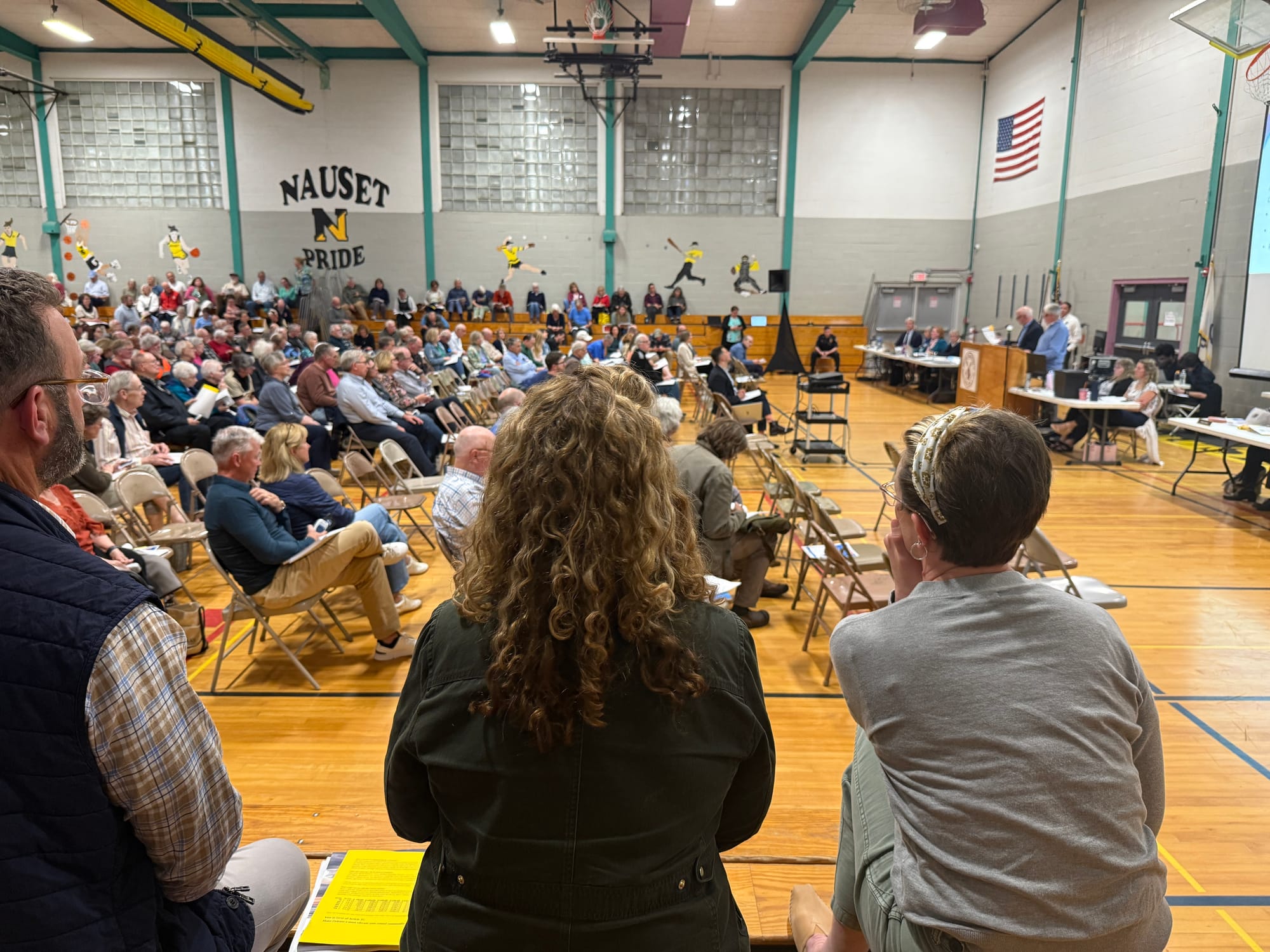It was a “streamlined” Warrant — just 36 articles — but last Monday’s Annual Town Meeting ran almost four hours. By comparison, that’s an hour shorter than last May’s meeting, which considered 54 articles, and 30 minutes longer than the meeting in May 2023, which considered 75.
There were moments of confusion and frustration — some with formatting changes, some with a lack of clarity in the Warrant. Residents laughed, vented, groaned, and even booed once or twice.
At the meeting’s height, 486 votes were cast. The last vote tally — at nearly 10 PM — was 241. The longest discussion — 42 minutes and 52 seconds — was around funding design costs for the new Fire-Rescue Station. Other protracted discussions were sparked by the Capital Budget, solar development, the Capital Improvements Plan, and a Citizen Petition to fund implementation of a Residential Tax Exemption.
Our Town’s financial health — specifically, whether we can afford to take on more debt — was a subject of debate, despite our AAA bond rating from Standard & Poor’s. Before voting got underway, Finance Committee Chair (and EXIT 89 advisor) Elaine Baird spoke to the Town’s economic health, citing the Finance Committee’s unanimous approval of all of the Warrant articles with one abstention. “As such,” she said, “the Finance Committee endorses the fiscal management of this town’s administration” — including the prospect of taking on more debt. But during the conversation about the new Fire-Rescue Station, Finance Committee member Ed Mahoney took to the mic to speak not about the new station but about the Town’s debt — a major problem, in his view. Challenging some of Baird’s statements, he encouraged residents to oppose the Capital Improvements Plan (Article 18) and the Capital Budget (Article 19).
“You can really vote ‘No,” Mahoney said. “Let me be clear, a ‘No’ vote is not a vote against a project, it’s a vote against the order and timing of those projects.”
Lynn Bruneau, former Finance Committee Chair/Member (and EXIT 89 advisor), spoke next, explaining the difference between the Capital Improvements Plan and the Capital Budget (for more on this, keep reading) correcting some of what Mahoney had said. “It makes no sense to vote ‘No’ on the ‘wish list’ in Article 18,” she cautioned, “or to keep kicking the can down the road by voting ‘No’ and delaying capital projects in Article 19.”
Highlights:
- Residents approved design costs for a new Fire-Rescue Station.
- Our Wastewater saga will enter Phase 3.
- Cannabis can be delivered by Orleans shops. (Provided the bylaw change is approved by the Attorney General + Town vote is certified.
- Orleans — or, at least three of its facilities — is going solar. (As long as costs don't exceed the funding limit.)
- The entire Capital Budget for FY 26 almost went “poof.” Yup. Poof.
Want the juicy details?
Read on.
Our Semi-Quick Recap:
Design Costs for a New Fire-Rescue Station — Article 12: To introduce Article 12, which asked voters to support borrowing $4.5 million for the design of a new station, Fire Chief Geof Deering presented a slideshow of the grim conditions at the existing station — a deteriorating building, cramped quarters, and exercise equipment sharing space with rescue vehicles. The facility is not only “outdated and with major deficiencies,” he said, but an unhealthy place to work. The 2021 feasibility study done by Ted Galante Architecture Studio (TGAS) gives the full picture.
Almost all 23 speakers on Article 12 supported a new station, but concerns around its potential location — in particular its proximity to Orleans Elementary School (OES) — were a recurring theme. OES Parent-Teacher Committee President Kristin LaPlante cited threats to the safety, security, and welfare of the students posed by constructing — and later operating — a facility so close to the school. While no location has been officially named, the site study done by Kaestle Boos Associates in 2022 identified a location behind the existing station (and closer to OES than the existing station) as optimal for emergency response times, which Chief Deering confirmed. A recently completed TGAS Town Campus Feasibility Study used that specific location — with the two buildings 137 feet apart — for its renderings, and was referenced by many speakers.
Subsequently, Select Board Chair Mark Mathison told residents, “all of the previous speakers that alluded to site plans for that property…the drawings on those pictures weren’t real. What we’re talking about tonight is creating something that is real.” Until an actual design is in hand, he added, discussing the station’s location “is just wasting everyone’s time.” The article passed with 28 votes over the two-thirds majority it needed, 352-134. It will still need approval at the Town Election tomorrow.
Town Operating + Enterprise Fund Budgets — Articles 14-17: Voters approved the $53.6 million Operating Budget for FY 26 — aka Article 14 — unanimously after just 6 minutes. They also made quick work of the three remaining Enterprise Fund budgets for FY 26 represented in Articles 15-17, passing all three budgets unanimously in another 6 minutes. (The two other Enterprise Funds, Moorings and Rock Harbor, will “sunset” effective July 1, 2025.)
That’s when things slowed down. Waaaaay down. The Capital Improvements Plan (Article 18) and the Capital Budget (Article 19) generated a LOT of comments — 24 speakers over a total of 44 minutes — and more than a little confusion and frustration.
Capital Improvements Plan + Capital Budget — Articles 18 + 19: Before we present the blow-by-blow of the rather dramatic 44 minutes these two articles consumed, here’s a quick review of the basics — which clearly were not widely understood by many speakers who entered the discussion.
Our Town Charter requires us to vote on a five-year Capital Improvements Plan (CIP) each year at Town Meeting. Our approved CIP is a non-binding document — sometimes referred to as a “wish list” — of capital projects that may be considered by the town over the coming five years. It appropriates no money and commits the town to nothing.
In contrast, the Capital Budget — presented on its own in Article 19 but later, confusingly, as part of the CIP — is an actual commitment to fund the coming fiscal year’s capital projects. Unlike in previous years, when each capital project was presented and voted on as its own separate Warrant article, most of FY 26’s capital projects were “bundled” into a single article, Article 19, to be voted on in one fell swoop.
What if someone opposed one — or more — of the projects in either Article 18 or 19? What if one — or both — fail to pass?
It became abundantly clear that many voters didn’t know — or understand the difference between the Capital Budget and the Capital Improvements Plan, much less the more esoteric procedures governing Town Meeting. One wonders why a Select Board member or the Town Manager did not take a few moments at the start of the discussion to explain.
Residents expressed discomfort with the new approach. Resident Ken Heritage called the bundling “annoying” and “undemocratic,” and opposed an item in the FY 27-FY 31 Capital Improvements Plan. It became clear, as time went on, that his particular complaint was actually with the Capital Budget, not the CIP. Regarding the actual CIP, resident David Burnham spoke against the $41 million allocation in FY 27 for a new Snow Library, and was assisted by Town Counsel and staff in writing and offering a motion to amend the article by moving the library project to FY 28 — despite the non-binding nature of the CIP. After several more comments, including former Snow Library Trustee Steven Gass’s point that “picking apart the CIP” was unnecessary and not a good use of Town Meeting time — Article 18 passed after 22 minutes with the Snow Library project moved to FY 28.
The discussion around the Capital Budget — “the one that is actually spending money,” as Select Board Member Meff Runyon put it — got even hairier. Several residents expressed dismay at the bundling strategy — despite the Town Manager, Town staff, Town Counsel and Moderator readily answering questions from the floor. An error in the lettering of the line items in the Warrant did not help.
Heritage rose again and asked for an explanation of a $100,000 expenditure called “Main Street Reconstruction” in the Warrant. DPW Director Rich Waldo said it was a data-gathering survey of the area between Academy Place and the Beach Road split to “note the limitations of the right-of-way so we can articulate the impacts to potential abutting properties as the design progresses.”
“Everything you’ve said, you’ve made the assumption the project is already approved,” Heritage replied. Waldo and Moderator Lyttle disagreed, but some residents weren’t having it. “Sounds to me like a done deal,” said resident Renee Andre. Heritage added, “This seems like something that’s being railroaded.” Explanations from the Transportation and Bikeways Advisory Committee did not assuage concerns. When, after 16.5 minutes, the electronic votes were tallied, the article — asking for approval of the entire Capital Budget — was two votes shy of the three-quarters majority required to pass. It failed, 337-114.
The room seemed a bit stunned. What had just happened — and what did it mean? In time, Select Board member Kevin Galligan suggested that someone who had voted against the article come forward with a motion to reconsider. “Otherwise,” Galligan explained, “no money can be spent — not one penny — on any Capital Budget projects for the entire year.”
Several articles later, Heritage — assisted by Cheryl Codair of the Finance Committee, Town staff, and Town Counsel Ford — offered a motion to reconsider Article 19, followed by another motion to remove the Main Street Reconstruction project from the Capital Budget. When asked what the consequences were of the article failing again, Moderator Lyttle said, “I think we’re screwed.” After another seventeen minutes, Article 19 passed, 370-41.
Will this “bundling” strategy be used in the future? It didn’t seem to save time — or engender trust from the floor.
Solar Development — Article 20: After resident Clint Kanaga stood up and expressed his view that “climate stuff” is a “hoax,” almost a dozen supporters of Article 20 — requesting $5 million to install solar arrays at three town-owned locations — pointed out that the economics of the project were compelling. They described the article as an opportunity to be energy-independent. “This is a very attractive business opportunity,” said Hakim Janah of the Energy & Climate Action Committee. “A ‘No’ vote is a vote for Eversource,” said resident Roger McDaniel. The article, which required a three-quarters majority because it wasn’t on last year’s CIP, passed 372-72.
Town Cove Bulkhead — Article 21: Natural Resources Manager and Harbormaster Nate Sears described the urgent need for a new bulkhead at the Goose Hummock Town Landing. Former DPW Director Tom Daley cited the huge legal liability the Town would face if it doesn’t replace the bulkhead, calling it “mission critical to move ahead.” Article 21 passed 403-11.
Wastewater Phase 3 — Article 24: Funding the next phase of our epic Wastewater Project was the subject of Article 24 – implementing Phase 3 or “Lakes and Ponds Sewer Area” — to the tune of $40.5 million. The article passed in 5 minutes, with no questions, by the required two-thirds vote, 343-34.
Wastewater Phase 2 Support — Article 25: This asked for $600,000 in incidental expenses to help residents in the Meetinghouse Pond Area connect with the Wastewater Collection System and related engineering services. After 9 minutes of conversation and questions from confused speakers — “Why didn’t we pay for this already?” and “I don’t understand” were among the comments — both current and former DPW directors spoke to help explain. The article passed with the required two-thirds vote, 303-46.
Mill Pond Water Quality — Article 26: Resident Charlie Carlson, whose property overlooks Mill Pond, cited a “consultant mistake” in the creation of the 16-phase Wastewater Plan that left Mill Pond in the lurch. It has been shown by water testing to be the “worst body in town,” but not slated for sewering until Phase 11 (that's right, eleven) — many years away. After 6 minutes of discussion, Article 26, allocating $125,000 to explore shorter-term or alternative water-quality improvement strategies there, passed with the required three-quarters vote, 305-24.
Cannabis Couriers — Article 27: Orleans residents are already able to receive pot deliveries from licensed shops in other towns. Article 27 allows the two Orleans shops, Seaside Cannabis and Ember Gardens, to deliver — which would keep tax revenue from those sales here, too. It would also bring Orleans into alignment with Massachusetts cannabis control regulations. After six speakers and 7.5 minutes of discussion, the article passed with the needed two-thirds majority, 215-90.
Seasonal Communities Designation — Article 31: The Massachusetts Seasonal Communities Designation passed unanimously.
Residential Tax Exemption (RTE) — Article 35: This was a Citizen Petition — not a directive or a monetary commitment, but basically a gauge of residents’ interest in exploring an RTE. And citizens definitely expressed interest. As the name suggests, a Residential Tax Exemption (or RTE) offers a tax break to certain year-round residents, to be offset by higher taxes for some second-home owners and other high-dollar value property owners. An RTE would be revenue-neutral to the Town, except for the cost of establishing and running the program. Some in opposition shared the concern that adopting this type of exemption would be a slap in the face to second-home owners, the base of much of our economy. Mark Berson, an attorney and member of the Board of Water & Sewer Commissioners, suggested it could invite an avalanche of lawsuits. Tim Counihan, author of the petition, successfully made the case for exploring an RTE — an initiative that has been adopted elsewhere on the Cape, and across the Commonwealth and the country. After 14 speakers and nearly 26 minutes, Article 35 passed, 153-88.
And…that’s all, folks!
Still Yearning for More?
- Watch the whole meeting — we suggest at 2.5 speed.
- Take a look at Town Hall’s Town Meeting page.
- EXIT 89’s Preview of Town Meeting has more detailed explanations of Warrant articles.
- Here's The Cape Cod Chronicle’s Town Meeting wrap-up.
- Kim Newman's note to residents on Instagram.
- The latest episode of Orleans: Behind the Scenes features Mark Mathison and Kevin Galligan from the Select Board sharing their takes on Monday’s Town Meeting.

Vote Again Tomorrow!
Tomorrow is your last chance to vote in our Annual Election — Tuesday, May 20, 9:00 AM to 7:00 PM at the Council on Aging/Senior Center, 150 Rock Harbor Road. Along with questions concerning funding overrides for the new Fire-Rescue Station design, Town Cove bulkhead, solar projects, and Wastewater Phases 2 + 3, we’ll be voting for the following Town Officers:
1 Moderator
2 Select Board seats
2 Constable seats
1 Health Board seat
1 Nauset Regional School Committee seat
1 Elementary School Committee seat
1 Housing Authority seat
2 Snow Library Trustee seats
Want to see a sample ballot? Here you go.

EXIT 89 is an independent publication. Our mission is to help Orleans voters make sense of town issues by providing a clear and impartial overview of the latest developments. We want to help fill the information gap, reduce the "mystery" of Town Meeting, and promote vibrant civic engagement.
Our hyperlocal digest is researched and written by journalists Martha Sherrill and Emily Miller. Elaine Baird and Lynn Bruneau are the founding advisors. We are all residents of Orleans. Editing, infographics and tech support are provided by Kazmira Nedeau of Sea Howl Bookshop.
Our digest is 100 percent free — and we aim to keep it that way. With Lower Cape Television (LCTV) — a 501(c)(3) — as our fiscal sponsor, all contributions are now tax-deductible. Donations by a check made out to "EXIT 89" will save us a processing fee. Please send these to: EXIT 89, P.O. Box 1145, Orleans, MA 02653, and thank you for your support!
You can also donate securely online by clicking here.
As always, we’d love to hear from you. What’s on your mind? What would you like to know more about? Readers have enriched our understanding of Orleans — and sharpened our focus. Please share questions, comments, and ideas for future issues by emailing them to hello@exit89.org. And if you are new to EXIT 89, please take a moment to sign up for a free subscription.

